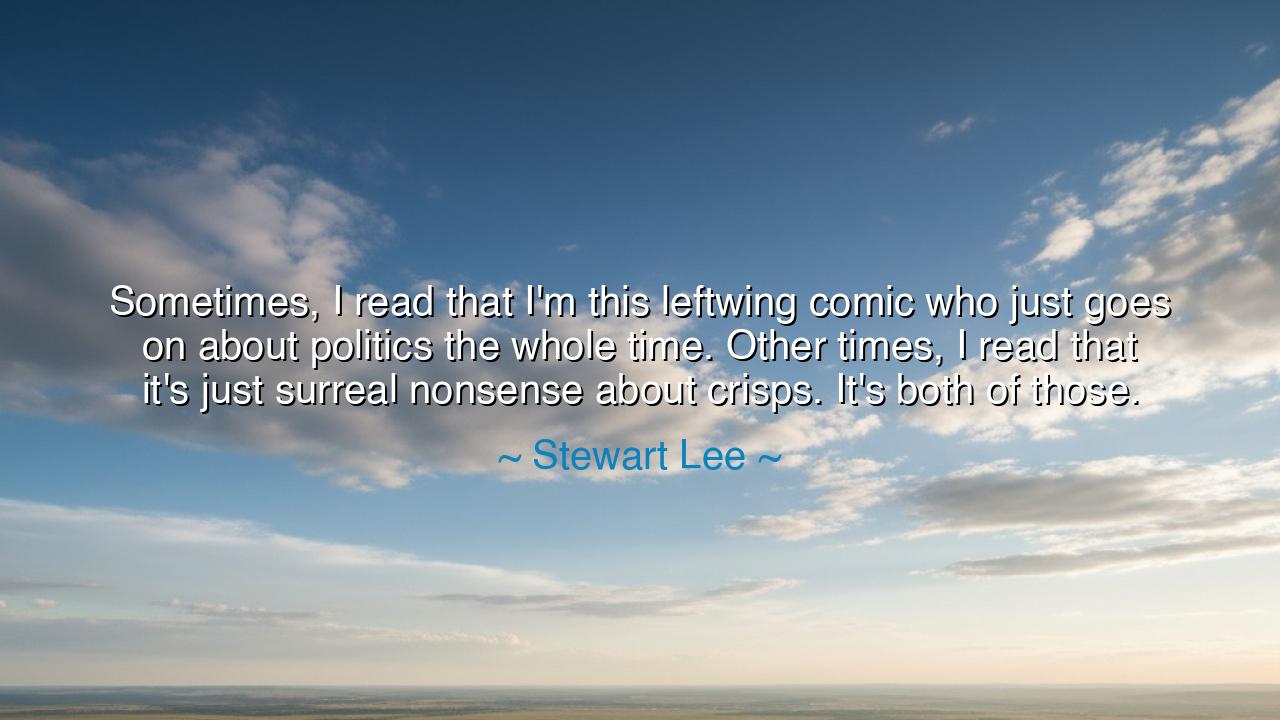
Sometimes, I read that I'm this leftwing comic who just goes on
Sometimes, I read that I'm this leftwing comic who just goes on about politics the whole time. Other times, I read that it's just surreal nonsense about crisps. It's both of those.






The words of Stewart Lee — “Sometimes, I read that I’m this leftwing comic who just goes on about politics the whole time. Other times, I read that it’s just surreal nonsense about crisps. It’s both of those.” — shine with the paradox of the artist’s voice. In them he acknowledges that the power of comedy lies not in one path alone, but in its freedom to wander between the serious and the absurd. For laughter can be a weapon against tyranny, and it can also be born from the simple strangeness of everyday life. Politics and nonsense are not opposites, but companions in the comic’s craft.
The meaning here is that true art refuses to be confined. Society may demand that a man be serious or frivolous, political or playful, but Lee declares himself both. To speak of politics is to challenge the structures of power, to pierce the armor of authority with satire. To speak of crisps — that most ordinary and ridiculous of subjects — is to remind us that life itself is strange, fleeting, and worthy of laughter. The union of these extremes is what gives comedy its enduring strength: it can both comfort and confront, both delight and disturb.
History offers proof of this duality. Consider the plays of Aristophanes in ancient Athens. He mocked war, leaders, and the follies of his city with biting politics, yet filled his works with bawdy jokes, absurd imagery, and surreal exaggeration. To his audiences, both elements were inseparable: they laughed at the ridiculousness of power and at the ridiculousness of life itself. Stewart Lee’s words stand in this same lineage, where the comic is both jester and philosopher.
The origin of his statement lies in the tension between perception and reality. Critics, ever eager to categorize, attempt to bind the artist into a single identity — the leftwing satirist, or the absurd surrealist. But Lee reminds us that to be true to oneself is to refuse such narrow cages. Art that endures is not predictable, but expansive, embracing contradiction as the very essence of humanity.
Therefore, O seekers of wisdom, mark this truth: do not fear contradiction, for it is the pulse of life. One may speak with fire about politics, and in the next breath muse upon the absurdity of crisps — and both are worthy. For laughter is a bridge that carries us across the harshness of the world, and the comic who unites the serious and the surreal teaches us that wisdom need not always wear a solemn face. As Stewart Lee declares, it is not one or the other — it is both of those, and therein lies its power.






DSDang Son
Stewart Lee’s comment about the different ways people perceive his work makes me think about how multifaceted comedy can be. It’s not just about making people laugh; it’s about making them think. But does the surrealism sometimes overshadow the politics, or does it serve as a vehicle to explore deeper themes? How much does the audience’s perception of absurdity affect the impact of the political messages being delivered?
KTnguyen khanh tung
I find Stewart Lee’s willingness to accept contradictory interpretations of his work refreshing. It shows that comedy is often about challenging perceptions and pushing boundaries. But does that make it harder for the audience to take him seriously on certain topics? Could a comedian who mixes surrealism with politics risk losing the power of their message if it becomes too outlandish? Is it the absurdity itself that makes the political points even more striking?
NGNguyen Giang
Stewart Lee's approach to comedy seems like a deliberate choice to defy expectations. By mixing political commentary with surreal humor, he captures a certain unpredictability in his performances. How does his audience respond to this blend of styles? Do they engage with his political messages more deeply because they are wrapped in absurdity, or does the surrealism distract from the important topics he touches on?
TNThuy Nguyen
It’s fascinating how Stewart Lee acknowledges being both a leftwing comic and a surrealist. The way he balances these seemingly contrasting elements makes me think about how humor is often a reflection of the times. Can comedy be effective if it’s purely political, or does the absurdity provide a much-needed relief from the heaviness of current affairs? Do we need the surreal nonsense to process the political realities around us?
HYBui Pham Hai Yen
I love how Stewart Lee embraces the contradiction in his work. Politics and surrealism don’t seem like natural bedfellows, but Lee’s ability to blend the two shows just how fluid comedy can be. It makes me wonder, though, how often audiences miss the deeper political message when they’re distracted by the absurdity. Is the surrealism just a way to get people to think, or is it also a form of social commentary in itself?